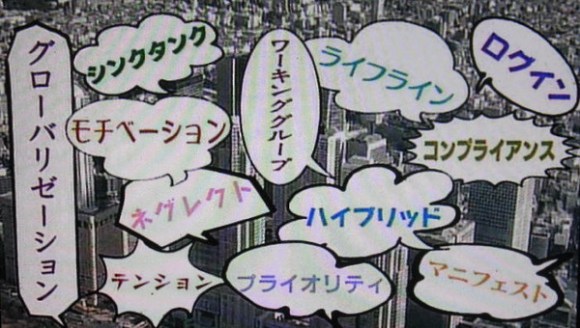
“Risuku (risk), kea (care), toraburu (trouble), asuri-to (athlete); I can’t understand what the hell they’re talking about!” vented 71-year-old Gifu Prefecture resident Hoji Takahashi.
Takahashi, a former public servant and sponsor of the “Cherish the Japanese Language Group,” filed suit against Japan Broadcasting Corporation (NHK) in Nagoya district court on June 25 for emotional distress. Claiming he is unable to comprehend programming content due to the broadcaster’s excessive use of foreign load words, or gairaigo, Takahashi is seeking 1.41 million yen (US$14,000) for the pain and suffering he has had to endure.
“By causing mental anguish to people who feel uncomfortable with the excessive use of foreign languages,” Takahashi believes NHK is guilty of acting illegally under Article 709 of the civil code. Emphasizing that he had signed a contract enabling him to receive and watch NHK broadcasts (technically, something everybody in Japan with a working television must do), Takahashi felt the broadcaster was unnecessarily subjecting him to foreign language loan words such as konshieruju (concierge) and konpuriansu (compliance) when there were perfectly acceptable Japanese words available to convey the same meaning.
“Young people can probably understand a lot of this stuff, but for older people like myself, when I hear asuri-to and konpriansu, I don’t know what it means. I wrote and asked NHK about this issue, but they failed to respond so I am suing them.”
A spokesperson for the NHK broadcasting office in Nagoya declined comment, stating, “I don’t fully know the details of the complaint.”
What do you think, are Takahashi’s gripes legit?
Source: alfalfalfa
Top Image: News Plus

 NHK TV worker woken by earthquake, gives viewers a show by accident
NHK TV worker woken by earthquake, gives viewers a show by accident NHK can now pester you through your mail thanks to new service from Japan Post
NHK can now pester you through your mail thanks to new service from Japan Post Japanese musician uses female pubic hair to produce unprecedented sound in new song【Video】
Japanese musician uses female pubic hair to produce unprecedented sound in new song【Video】 Man arrested for spraying Japan’s public broadcasting fee collector with fire extinguisher
Man arrested for spraying Japan’s public broadcasting fee collector with fire extinguisher Japan’s public broadcaster wins landmark court case and 12 bucks
Japan’s public broadcaster wins landmark court case and 12 bucks McDonald’s new Happy Meals offer up cute and practical Sanrio lifestyle goods
McDonald’s new Happy Meals offer up cute and practical Sanrio lifestyle goods All-you-can-drink Starbucks and amazing views part of Tokyo’s new 170 meter-high sky lounge
All-you-can-drink Starbucks and amazing views part of Tokyo’s new 170 meter-high sky lounge Super Nintendo World expansion gets delayed for several months at Universal Studios Japan
Super Nintendo World expansion gets delayed for several months at Universal Studios Japan McDonald’s Japan releases a pancake pie for new retro kissaten coffeeshop series
McDonald’s Japan releases a pancake pie for new retro kissaten coffeeshop series Studio Ghibli glasses cases let anime characters keep an eye on your spectacles
Studio Ghibli glasses cases let anime characters keep an eye on your spectacles Beautiful Sailor Moon manhole cover coasters being given out for free by Tokyo tourist center
Beautiful Sailor Moon manhole cover coasters being given out for free by Tokyo tourist center More foreign tourists than ever before in history visited Japan last month
More foreign tourists than ever before in history visited Japan last month Japan’s 30 Best Selling Video Games of All Time
Japan’s 30 Best Selling Video Games of All Time Randomly running into a great sushi lunch like this is one of the best things about eating in Tokyo
Randomly running into a great sushi lunch like this is one of the best things about eating in Tokyo Japanese fans rank the top 10 most beautiful female characters from Studio Ghibli anime movies
Japanese fans rank the top 10 most beautiful female characters from Studio Ghibli anime movies Disney princesses get official manga makeovers for Manga Princess Cafe opening in Tokyo
Disney princesses get official manga makeovers for Manga Princess Cafe opening in Tokyo Starbucks reopens at Shibuya Scramble Crossing with new look and design concept
Starbucks reopens at Shibuya Scramble Crossing with new look and design concept Beautiful new Final Fantasy T-shirt collection on the way from Uniqlo【Photos】
Beautiful new Final Fantasy T-shirt collection on the way from Uniqlo【Photos】 Is the new Shinkansen Train Desk ticket worth it?
Is the new Shinkansen Train Desk ticket worth it? Foreign English teachers in Japan pick their favorite Japanese-language phrases【Survey】
Foreign English teachers in Japan pick their favorite Japanese-language phrases【Survey】 Japanese convenience store packs a whole bento into an onigiri rice ball
Japanese convenience store packs a whole bento into an onigiri rice ball We try out “Chan Ramen”, an underground type of ramen popular in the ramen community
We try out “Chan Ramen”, an underground type of ramen popular in the ramen community Studio Ghibli releases Kiki’s Delivery Service chocolate cake pouches in Japan
Studio Ghibli releases Kiki’s Delivery Service chocolate cake pouches in Japan Japan’s bone-breaking and record-breaking roller coaster is permanently shutting down
Japan’s bone-breaking and record-breaking roller coaster is permanently shutting down New definition of “Japanese whiskey” goes into effect to prevent fakes from fooling overseas buyers
New definition of “Japanese whiskey” goes into effect to prevent fakes from fooling overseas buyers Our Japanese reporter visits Costco in the U.S., finds super American and very Japanese things
Our Japanese reporter visits Costco in the U.S., finds super American and very Japanese things Studio Ghibli unveils Mother’s Day gift set that captures the love in My Neighbour Totoro
Studio Ghibli unveils Mother’s Day gift set that captures the love in My Neighbour Totoro Foreign passenger shoves conductor on one of the last full runs for Japan’s Thunderbird train
Foreign passenger shoves conductor on one of the last full runs for Japan’s Thunderbird train Domino’s Japan now sells…pizza ears?
Domino’s Japan now sells…pizza ears? New Japanese KitKat flavour stars Sanrio characters, including Hello Kitty
New Japanese KitKat flavour stars Sanrio characters, including Hello Kitty Kyoto creates new for-tourist buses to address overtourism with higher prices, faster rides
Kyoto creates new for-tourist buses to address overtourism with higher prices, faster rides Sales of Japan’s most convenient train ticket/shopping payment cards suspended indefinitely
Sales of Japan’s most convenient train ticket/shopping payment cards suspended indefinitely Sold-out Studio Ghibli desktop humidifiers are back so Totoro can help you through the dry season
Sold-out Studio Ghibli desktop humidifiers are back so Totoro can help you through the dry season Japanese government to make first change to romanization spelling rules since the 1950s
Japanese government to make first change to romanization spelling rules since the 1950s Ghibli founders Toshio Suzuki and Hayao Miyazaki contribute to Japanese whisky Totoro label design
Ghibli founders Toshio Suzuki and Hayao Miyazaki contribute to Japanese whisky Totoro label design Doraemon found buried at sea as scene from 1993 anime becomes real life【Photos】
Doraemon found buried at sea as scene from 1993 anime becomes real life【Photos】 Tokyo’s most famous Starbucks is closed
Tokyo’s most famous Starbucks is closed One Piece characters’ nationalities revealed, but fans have mixed opinions
One Piece characters’ nationalities revealed, but fans have mixed opinions We asked a Uniqlo employee what four things we should buy and their suggestions didn’t disappoint
We asked a Uniqlo employee what four things we should buy and their suggestions didn’t disappoint Princesses, fruits, and blacksmiths: Study reveals the 30 most unusual family names in Japan
Princesses, fruits, and blacksmiths: Study reveals the 30 most unusual family names in Japan NHK bill collector arrested for kissing woman on the job: “I thought we were hitting it off!”
NHK bill collector arrested for kissing woman on the job: “I thought we were hitting it off!” Japanese TV broadcaster captions Donald Trump’s sumo speech in Tokyo as just “English”
Japanese TV broadcaster captions Donald Trump’s sumo speech in Tokyo as just “English” The first images of Studio Ghibli’s first-ever CG anime are here!【Photos】
The first images of Studio Ghibli’s first-ever CG anime are here!【Photos】 Autopsy results, cause of death released for Yu-Gi-Oh! manga creator Kazuki Takahashi
Autopsy results, cause of death released for Yu-Gi-Oh! manga creator Kazuki Takahashi NHK has been reporting the wrong weather in Kōchi Prefecture for… four years?!
NHK has been reporting the wrong weather in Kōchi Prefecture for… four years?! “Don’t play for more than an hour a day”: Japanese video game master gives great advice
“Don’t play for more than an hour a day”: Japanese video game master gives great advice You do NOT want to play Mario Party against this 63-year-old lightning-fast Japanese gamer【Vids】
You do NOT want to play Mario Party against this 63-year-old lightning-fast Japanese gamer【Vids】 “Sushi terrorist” found guilty in Nagoya District Court
“Sushi terrorist” found guilty in Nagoya District Court Tokyo court rules that hotels must pay NHK fees according to the number of rooms with TVs
Tokyo court rules that hotels must pay NHK fees according to the number of rooms with TVs Japan’s public broadcaster goes thug-style, tags the house of man who refuses to pay fees
Japan’s public broadcaster goes thug-style, tags the house of man who refuses to pay fees “Protect the Nation from NHK Party” becomes “Protect the Nation from Old Parties Party”
“Protect the Nation from NHK Party” becomes “Protect the Nation from Old Parties Party” Chiba election heating up with surprise marriage proposal and an ambitious Disney-loving clown full of promises
Chiba election heating up with surprise marriage proposal and an ambitious Disney-loving clown full of promises Anime pro’s awesome video shows how to beat stay-at-home boredom: Imagine you’re fighting a ninja
Anime pro’s awesome video shows how to beat stay-at-home boredom: Imagine you’re fighting a ninja Yoshiki and Kiss to perform together again on Japan’s New Year’s Eve music extravaganza Kohaku
Yoshiki and Kiss to perform together again on Japan’s New Year’s Eve music extravaganza Kohaku Japan will no longer require pre-departure COVID tests for international travelers
Japan will no longer require pre-departure COVID tests for international travelers Tokyo University and NHK on the verge of touch-o-vision: Television you can truly feel a part of
Tokyo University and NHK on the verge of touch-o-vision: Television you can truly feel a part of
Leave a Reply